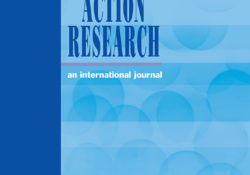tandfonline.com har udgivet en rapport under søgningen “Teacher Education Mathematics”: Abstract Abstract There has been an increase in research regarding experiences within virtual education. However, little attention has been given to the middle level context. Through a theoretical lens grounded in stage-environment fit theory, this phenomenological case study describes the lived experiences of two middle level virtual learners as they engage in an academic year of virtual middle school. Their shared experiences give attention to a need for relatedness, self-efficacy, motivation and autonomy in the virtual context. Link til kilde
Like this:
Like Loading...
eric.ed.gov har udgivet: This action research project was designed to increase students’ math competencies and reduce math anxiety in targeted high school classes in a Midwestern suburb. The study included 37 students and took place from September through December in 2002. Factors influencing students’ math achievement included self-perceptions of math competence, teachers’ perceptions of students’ abilities, and an overemphasis on remediation which left students unchallenged and behind their peers (Fiore, 1999). Curriculum redesign is one way of improving students’ confidence and competence in their math abilities (Allexsaht-Snider and Hart, 2001). Given this, a curriculum redesign was selected as an intervention for this study. To document student progress in mathematical achievement and improve self-perception, methods of assessment used included surveys, document analysis, and observations. Post-intervention data indicated an increase in students’… Continue Reading →
Like this:
Like Loading...
eric.ed.gov har udgivet: While it is important for college and university senior administrators to embrace the traditional roles of their administrative positions, senior administrators’ interactions with students also shape institutional culture, students’ engagement, and ultimately play a role in students’ motivation to succeed. This engagement is especially evident in the Historically Black College and University (HBCU) context as senior administrators’ engagement with students can directly or indirectly affect how students perceive themselves and their ability to succeed. This article aims to illuminate the role that HBCU senior level administrators play in students’ motivation toward success. We also highlight the notion that senior level administrators’ role in organizational culture ultimately led historically-disempowered Black women students toward success in even the most historically inaccessible pathways in the science, technology, engineering, and math… Continue Reading →
Like this:
Like Loading...
eric.ed.gov har udgivet: In this study, different factors affecting students’ differential equations (DEs) solving abilities were explored at pre university level. To explore main factors affecting students’ differential equations problem solving ability, articles for a 19-year period, from 1996 to 2015, were critically reviewed and analyzed. It was revealed that combination of four factors; “epistemological math problem solving beliefs, belief about usefulness of mathematics, self-regulated learning (SRL) strategies and goal orientations” have great potential to enhance differential equation problem ability. Based on these findings, a conceptual model was developed and presented in this paper to enhance differential equation problem solving ability. This study has provided several important implications for the curriculum designers and teachers to enhance conceptual understanding in differential equation problem solving, particularly in the developing countries.. Link til… Continue Reading →
Like this:
Like Loading...
tandfonline.com har udgivet en rapport under søgningen “Teacher Education Mathematics”: ABSTRACT ABSTRACT The aim of the present study is to advocate the use of a participatory action research programme, the Formative Scaffolding Programme (FSP), in mathematics. The FSP’s main structure is presented as well as an implementation of a class intervention, with the aim of exploring the FSP test cycle’s virtues in a social science class in a Swedish upper-secondary school. The motivations for the FSP’s development were to enhance students’ awareness of their mathematical proficiency, alter the level and strength of their self-efficacy, foster self-regulated learning (SRL), reduce and prevent mathematics-related anxiety, and visualise the learning process in mathematics. The primary findings of the study were there was a resemblance between the FSP setting and SRL phases, and that participation… Continue Reading →
Like this:
Like Loading...
eric.ed.gov har udgivet: Profile analyses were used to investigate differences in the self-efficacy growth of teachers with more and less mathematics background as the teachers participated in professional development across two summers. Professional development activities were associated with increases in teachers’ self-efficacy; however, without considering mathematics knowledge for teaching, teachers with more math background tended to benefit more than those with less background. Nonetheless, teachers with less math background had higher levels of teacher self-efficacy although this gap was closed by the last measurement. Such considerations are important when designing professional development as teachers may have different needs based on specific characteristics such as preparation in their teaching domain. (Contains 3 tables and 4 figures.) Link til kilde
Like this:
Like Loading...

tandfonline.com har udgivet en rapport under søgningen “Teacher Education Mathematics”: ABSTRACT ABSTRACT Previous studies have indicated that, although some teachers have substantial expectation effects on student outcomes, the effects for most teachers are only small. Furthermore, teacher expectations are associated with key pedagogical differences related to teacher beliefs about providing instruction and support for learning. The aim of this study was to explore (a) teacher-level differences in the level and differentiation of expectations, (b) associations between teacher differences in expectations and teacher background and beliefs, and (c) relationships with subsequent student performance. Secondary analyses were performed on data for 42 teachers and their students in New Zealand. The results were supportive of the notion that some teachers were differentiating more between students in their expectations than others. Teachers who differentiated… Continue Reading →
Like this:
Like Loading...

tandfonline.com har udgivet en rapport under søgningen “Teacher Education Mathematics”: ABSTRACT ABSTRACT Collaboration between schools and parents has become increasingly prominent on the political agenda in Norway. Schools are obliged to promote parent–school cooperation in accordance with parents’ rights as stakeholders in education. This article explores the governing strategies of seven primary or lower-secondary schools that have taken initiatives to improve parent–school collaboration. The main intention is to explore how New Public Management (NPM) measures (such as market values, decentralization, competition, and output control) and New Public Service (NPS) tools (including coalition building and citizens’ involvement) are reproduced at the local level when parent–school collaboration is put on the agenda. The analysis shows that street-level discretion at school level implies considerable uncertainty around the achievement of policy objectives. Different opinions… Continue Reading →
Like this:
Like Loading...
eric.ed.gov har udgivet: Research studies proved that teachers’ self-efficacy is directly related to students’ academic achievement and overall learning. The current study was conducted to explore relationship of mathematics teachers’ self-efficacy with students’ academic achievement at secondary level. A sample of 576 respondents with a break up of 96 math teachers (48 male and 48 female) and 480 students (240 male and 240 female) from six districts (Chakwal, Attock, Mianwali, Lahore, Leyyah and Muzaffar Garah) of the Punjab province. Academic score of the Students in the subject of mathematics was collected from relevant (BISE) documents. Pearson correlation was used to determine association between self-efficacy and academic achievement. Math male teachers’ self-efficacy and math female teachers’ self-efficacy was also compared on t-test assuming two sample having equal variances. No significant difference… Continue Reading →
Like this:
Like Loading...
tandfonline.com har udgivet en rapport under søgningen “Teacher Education Mathematics”: Abstract Abstract Achievement test is a mechanism to measure student’s knowledge and abilities. Numerous categories of achievement tests have been developed by different scholars and psychologists. Since they do not directly consider curriculum adopted during the course of study of students, they do not reflect truly upon the achievements of students. We propose an achievement test which is computerized and is based on assessment of RAW (reading, arithmetic and writing) capabilities considering curriculum used for imparting education. We set compositions and contents according to age group and educational standards. We then conduct a series of experiments to show how an achievement test linked with a curriculum is reflective, in a better manner, of the student’s achievement index then a general… Continue Reading →
Like this:
Like Loading...




